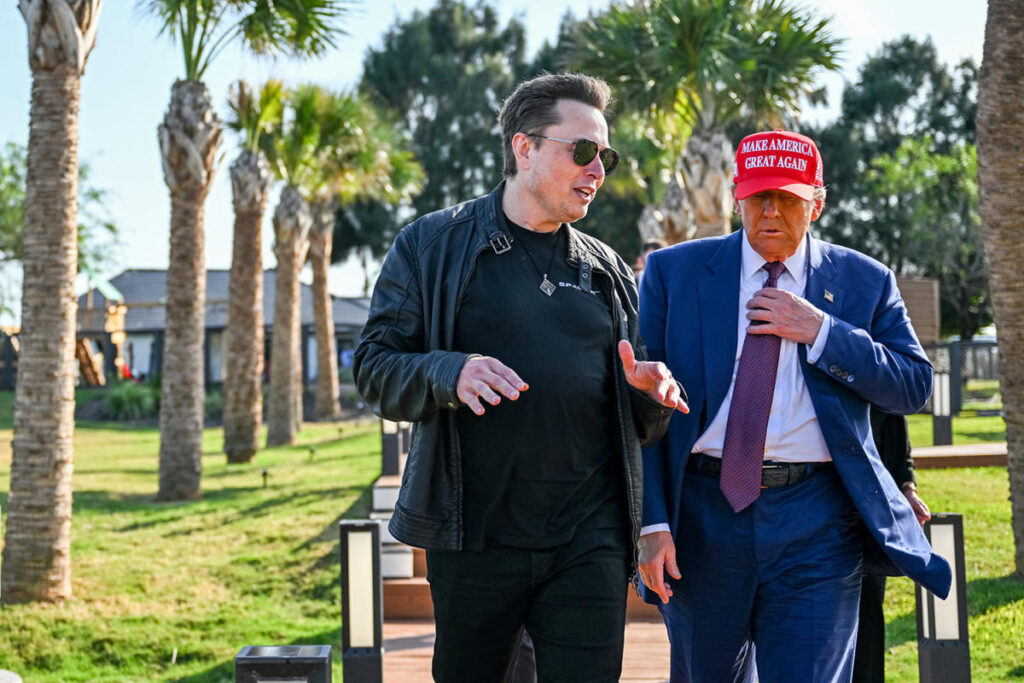As Congress grappled with a potential government shutdown, the political landscape was notably influenced by the actions of Elon Musk and the looming presence of Donald Trump. Initially, lawmakers thought they had a bipartisan deal that would keep the government funded and allow them to adjourn for the holidays. However, this notion was upended when Trump, aided by Musk, dramatically undermined the bipartisan funding legislation drafted by House Speaker Mike Johnson. Trump labeled the plan “ridiculous and extraordinarily expensive,” igniting anger among conservative Republicans and right-wing commentators, who saw it as a failed attempt at “establishment” politics. The fallout resulted in House Republicans quickly pivoting to a new plan that garnered the endorsement of both Musk and Trump, yet it also faced significant opposition from within their party.
Despite the backing of high-profile figures, the new legislative proposal, intended to stave off a shutdown until mid-March, was ultimately rejected, marking a setback for Trump, who had hoped to reassert his influence over the Republican Party. The friction revealed underlying political dynamics, particularly the relationship between Musk, the wealthy entrepreneur, and Trump, the former president. While Trump maintained a semblance of control with his public stance and strategy, it was evident that Musk’s financial clout and social media reach had the potential to sway opinions among lawmakers. This situation suggested a reshaped power dynamic where a billionaire could play a pivotal role in funding political campaigns and pushing specific agendas, which alarmed many within the political sphere.
Musk’s involvement sparked conversations about the boundaries of influence in American politics, particularly regarding his ability to affect legislative outcomes without being an elected official. His social media presence on X, where he commands a following of over 208 million users, allowed him to voice his opposition against traditional funding routes vehemently. He threatened to support primary challenges for any Republicans who voted in favor of the original funding plan, which underlined his growing role in Republican politics. Though Trump attempted to affirm his role as the dominant force within the party, the rapid developments illustrated a shift where Musk’s viewpoints mattered significantly in shaping legislative strategies.
As congressional negotiations intensified, dissent emerged among House Republicans concerning Trump’s and Musk’s political maneuvers. Some members voiced discontent with the new spending legislation, criticizing it for its increase in national debt without substantial spending cuts. The failure of the second proposed budget deal showcased the challenges Trump faced in uniting the Republican Party, revealing existing divisions over fiscal responsibility and party strategy. Key figures like Rep. Chip Roy of Texas emerged as vocal critics, leading the charge against what they deemed an ineffective and damaging new proposal. Threats of primary challenges from Trump only intensified their opposition, marking a fractious moment within the party that amounted to a struggle for ideological purity and control.
The collapse of the new budget plan left Congress grappling with an impending government shutdown, unfolding at a time when political alliances and strategies seemed in flux. As the clock ticked down to the potential shutdown, majority leaders indicated that they were considering various options, even as dissatisfaction brewed among Republicans over Musk’s and Trump’s growing influence. Organizations and movements aligned with conservative ideals celebrated the defeat of the original deal, framing it as a moment of triumph against “Washington insiders.” Yet, despite the jubilation on one side of the ideological spectrum, the reality remained that the absence of a viable funding agreement loomed large, threatening not just the government but also the GOP’s ability to navigate future negotiations effectively.
Democratic leaders responded to the negotiations’ failures by critiquing the Republican maneuvering, framing Musk’s involvement as emblematic of the GOP’s alignment with billionaires at the expense of more responsible governance. High-profile Democrats like Rep. Nancy Pelosi leveraged the moment to accuse Republicans of abandoning their responsibilities to the American public, targeting Musk’s influence as a detrimental force reshaping political norms. Furthermore, questions arose regarding Trump’s ability to effectively negotiate with both sides of the aisle, particularly given his previous controversial tenure as president, which had left many within the party hesitant about his leadership style in the current political context.
As the dust settled on the failed proposals, lawmakers faced the reality of unfinished business as the deadline approached. Observations from within the Republican ranks highlighted the need for Trump to engage directly with legislators to find common ground and potentially influence the discussions positively. With the specter of a government shutdown looming large, coupled with new shifts in political alliances ushered in by figures like Musk, the future of congressional negotiations remained uncertain. The events underscored how intertwined personal influence and political strategy had become in the current landscape, suggesting a potentially transformative period for both the Republican Party and the broader political process.

